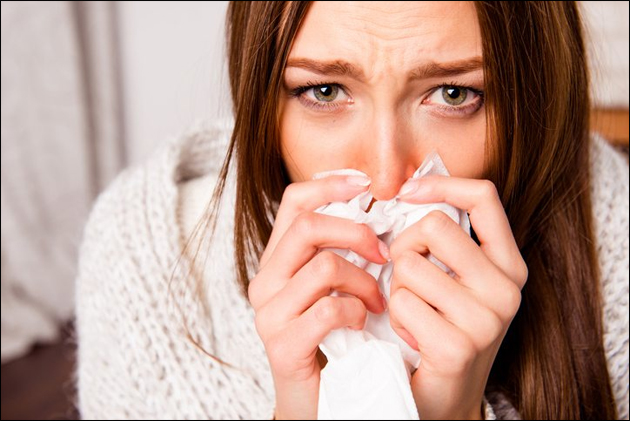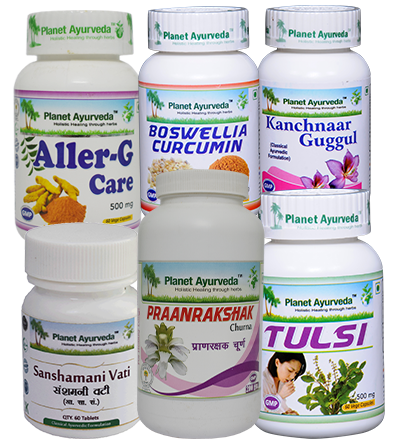How to Treat Gustatory Rhinitis with Herbal Remedies
ABSTRACT
Every other person has experienced rhinitis in their lifetime, some have allergies to dust or some have seasonal common colds. There is a special type of rhinitis arising after ingestion of food where people experience cold like symptoms. Sometimes it’s also embarrassing and discomforting for the person. As this is a common type of problem among the people, that’s why we are writing this article on gustatory rhinitis and its ayurvedic approach.
INTRODUCTION
Rhinitis is a condition related to the respiratory tract and nasal mucosa in which symptoms include congestion of the nose, runny nose, headache, sneezing etc. It is due to inflammation or dysfunction of the nasal mucosa. Gustatory rhinitis is a kind of non allergic and non inflammatory rhinitis in which the symptoms of rhinorrhoea are produced after in taking of the food. Food can be of any category but foods which are spicy and hot produce more symptoms than the food which are not spicy and hot like breads. It is not related with the sex, age etc but mostly seen in the patients of the age 20-60 years of the age. In ayurveda, rhinitis can be correlated by pratishyaya . It is widely explained in ayurvedic texts. The elimination of the kapha doshas through the nose is known as pratishyaya, which occurs due to imbalance in all the three doshas. The region above the clavicle is known to have dominant kapha dosha thus the predominant involved dosha is kapha dosha.

SUBGROUPS OF GUSTATORY RHINITIS
All the sub types can be unilateral or bilateral except one which is idiopathic gustatory rhinitis and is bilateral. The subtypes of gustatory rhinitis are as follows:-
- Idiopathic– Idiopathic gustatory mainly occurs due to the etiology of unknown origin.
- Post traumatic- this type of gustatory rhinitis occurs due to some kind of trauma to the related organs which has occurred in the past. The symptoms of rhinitis can aggravate on taking food, in a hot environment, during exercise, In cold, due to environmental irritants.
- Post-surgical- This Rhinitis occurs after having nose surgery or surgery of related organs.
- Gustatory rhinorrhoea associated with cranial nerve neuropathy- Imbalance in the stimulation of the cranial nerves leads to the gustatory rhinitis
SYMPTOMS OF GUSTATORY RHINITIS
Symptoms of gustatory rhinitis are similar to rhinitis without the symptoms of allergic rhinitis like itchy eyes etc.
- Sneezing
- Stuffy nose
- Post nasal drip
- Runny nose
CAUSES OF GUSTATORY RHINITIS
The causes of gustatory rhinitis are as follows
- Chilly
- Spices
- Garlic
- Increase in kapha dosha
- Increase in pitta dosha
- Yuva avastha
DIAGNOSIS OF GUSTATORY RHINITIS
- Its diagnosis is usually clinical based when the patient tells the doctor about its conditions.
- Sometimes it requires allergen antibody tests to eliminate the allergic type of rhinitis.
- Nasal endoscopy which is usually a test for examining the nasal mucosa.
TREATMENT OF GUSTATORY RHINITIS
Sometimes it usually does not require any treatment if the symptoms are mild you can only avoid triggering foods. If the symptoms of gustatory rhinitis are bothering you then the following treatments should be taken which can be taken for the gustatory rhinitis these treatments you can take before in taking of food
- Saline nasal spray
- Corticosteroid nasal spray
- Anti-drip anti- cholinergic nasal sprays
- Decongestants
- Atropine has proven benefits for the gustatory rhinitis
AYURVEDIC TREATMENT FOR GUSTATORY RHINITIS
Many modern treatments are present for the gustatory rhinitis but these all treatments are temporary and provide symptomatic relief for the problem but with the help of ayurvedic medications this disorder can be treated permanently as the ayurvedic medicine works on the root cause of the problem and treats the problem.
There are two stages of pratishyaya 1st is ama stage (can be correlated as acute stage) and pakwa pratishyaya (can be correlated with chronic pratishyaya) so in ayurveda treatment is done according to these stages
Treatment for Ama stage (Acute stage)
- First fasting is done for 3-5 days
- Then swedana (Sudation therapy)
- Administration of deepan pachan drugs
Treatment for Pakwa stage (Chronic stage)
- Taking ghrit (clarified butter)
- Sudation with sour herbs
- Vaman and virechana
- Inhalation of medicated smoke through nose
- Covering the head with thick and hot clothes
Oral intake of herbs like- chitra mool (Plumbago Indica), Adrak (Zingiber officinale), shunthi (Zingiber Officinale), yastimadhu (Glycyrrhiza Glabra) , ajmoda (Apium graveolens) , pudina (Mentha spicata) and some formulations like triphala, trijata, panchkol, etc
TREATMENT FOR GUSTATORY RHINITIS FROM PLANET AYURVEDA

Planet Ayurveda has medicines which can be used for the treatment of gustatory rhinitis. These medicines are made using pure herbs which are made with the combination of the herbs made under the supervision of expert guidance and under a pure and hygienic environment. These medicines are free from preservatives, fillers and gelatin capsules.
- Aller-G care capsules
- Pitta balance capsules
- Chitrak haritaki
PRODUCTS DESCRIPTION
1. Aller-G care capsules
It has herbs like haridra (Curcuma longa), Neem (Azadirachta Indica), shirish (albizialubbock), Ashwagandha (withania Somnifera) these herbs are known to have effects on the symptoms like allergy and treatment for the symptoms of respiratory tract like nasal decongestant, asthma, flu rhinitis, bronchitis etc.
Dosage – 1 capsule twice daily with plain water after meals
2. Pitta balance capsules
It has ingredients like praval pishti (coral calcium), akik pishti (agate calcium), jahar mohra pishti (an ayurvedic calcium compound), kamdudha ras (an ayurvedic calcium compound), Giloy (Tinospora cordifolia), mukta pishti (pearl calcium) all these drugs are very effective for balancing pitta dosha as the name suggests, these will act on the increased pitta dosha in body and will balance it.
Dosage– 1 capsule twice daily with plain water after meals.
3. Chitrak haritaki
It is a medicine which is available in avleh form which has a jam-like consistency. This is made using 11 ingredients and the main ingredients are chitrak (Plumbago Zeylanica), haritaki (Terminalia Chebula).
Dosage– 1 tsp twice daily with plain water after meals.
DIET FOR GUSTATORY RHINITIS
Diet of the patient should be well balanced and it should not be too spicy or hot nor too cold. It should not aggravate the kapha dosha or pitta doshas. The diet should be balanced for three doshas and according to the prakriti of the patient , taking care of the kaa (time /weather), and according to desha( place where the patient is residing).
Some tips for dieting are
- Use of pomegranate
- Use of ghee (clarified butter)
- Use of split black lentils
- Taking balanced diet
- Use of fox nuts etc
CONTRA-INDICATIONS FOR GUSTATORY RHINITIS
- Taking bath in cold water
- Coitus
- Excess sleep
- Taking stress
- Suppression of natural urges
- Intake of alcohol
- Anger
- Exposure to dust and cold
- Cold food or food which is kept in fridge
- Anger
CONCLUSION
We can conclude that gustatory rhinitis is a condition which arises due to eating hot and spicy food. There are modern treatments available for it but these are temporary treatments. There are many ayurvedic treatments also which are very effective. Planet ayurveda has a wide variety of medicines for gustatory rhinitis to treat the symptoms and eliminate the disease.




